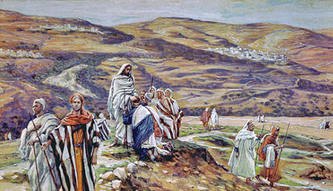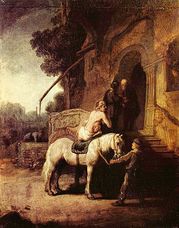 Good Samaritan, Rembrandt 1630 How does Jesus reframe the original question of the lawyer? Which of these three, do you think, proved to be a neighbor to the man who fell among the robbers?" (Luke 10:36) The parable of the Good Samaritan is one of the most highly quoted sections of the bible, since even secular thinkers can appreciate Jesus answer to the lawyer's question, “and who is my neighbor?” However, what seems to be unfortunately left out is the purpose and thus main thrust of the parable itself. For the the original question had nothing to do with being a good neighbor, the question that prompted the entire conversation was “what must I do to inherit eternal life?” (Luke 10:25). Jesus probed the man's understanding, to which Christ affirmed his answer:
2 Comments
אֶהְיֶה אֲשֶׁר אֶהְיֶה During the feast of Tabernacles in Jerusalem, Jesus continued alluding to the fact that He and the God of the Jews, were one and the same, a fact that the religious leaders of the day didn't take too kindly too. John describes a scene in the temple court of women where the Pharisee's are denouncing Christ's testimony that “I am the light of the world” (John 8:12). Jesus had already been recorded typologically inserting Himself into God's role during the foundational historical story of the Israelites' exodus through the desert. Jesus had already claimed: “I am” the bread of life (John 6:32), which was previewed by the desert manna, that He offered living water (John 7:37), which was previewed by water from the rock, and now “I am” the light “...who illumines the walk of the believer through a dark world...,” which was previewed by the “pillar of fire illumining Israel's path at night” (Howell, 211).
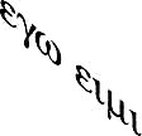 John 6:35 I am the bread of life John 8:12 I am the light of the world. John 10:7, 9 I am the door of the sheep John 10:11, 14 I am the good shepherd John 11:25: I am the resurrection and the life. John 14:6: I am the way, and the truth, and the life. John 15:1, 5 I am the true vine, and my Father is the vinedresser 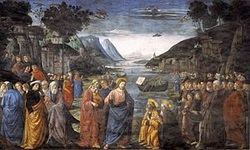 Domenico Ghirlandaio, 1481 Christ's words to His disciples as He appointed them for their Galilean ministry clearly contain temporal elements that only applied at that time in a Kingdom “sneak preview.” For Christ's Great Commission to the same disciples 18 chapters later in Matthew (minus Judas Iscariot) expands the scope from “the lost sheep of Israel” to “the ends of the earth.” Even Paul said the gospel was “to the Jew first and also to the Greek.” (Romans 1:16). Other elements of haste in Christ's words clearly indicate their mission is to now remain in the narrow Jewish “stream of salvation history...before eventually overflow[ing] its banks” to water the Gentile world (Howell, 161). However, there are principles in which these temporal commands were based which still apply to us today including, but not limited to:  The miraculous healing of the Gerasenes demoniac is an amazing encounter when the Kingdom of God triumphantly conquers a legion of demons from the Dominion of the Devil to liberate a tortured image-bearer of God with a single word, “Go!” Yet, the primary thing that captures the minds of commentators is the pigs. Plummer alone counts nine different interpretations to the question why Jesus would allow for the malicious destruction of innocent creatures and/or personal belongings, ranging from questioning the existence of demons, to questioning Christ's morality, to allegorical representations of Rome occupying Israel (Plummer, 228). 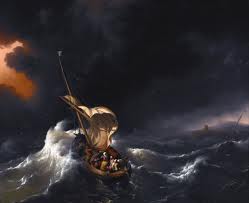 Calming a storm, Ludolf Backhuysen 1695 And a great windstorm arose, and the waves were breaking into the boat, so that the boat was already filling. But he was in the stern, asleep on the cushion. And they woke him and said to him, "Teacher, do you not care that we are perishing?" And he awoke and rebuked the wind and said to the sea, "Peace! Be still!" And the wind ceased, and there was a great calm. He said to them, "Why are you so afraid? Have you still no faith?" (Mark 4:37-40) Exhausted from ministry, Jesus falls asleep as His experienced fisherman disciples ferry Him across the sea when a tempest threatens to sink the boat. Jesus is so exhausted that the storm hasn't awoken Him by the time the boat is sinking, so His disciples do with a perplexing oxymoron of a question: “Teacher, don't you care if we drown?” After rebuking the nature He created, Jesus rightly rebukes His disciples. If they had faith enough to know that He could actually do something about the storm, then why didn't they have enough faith to trust that He wouldn't prevent them from drowning? 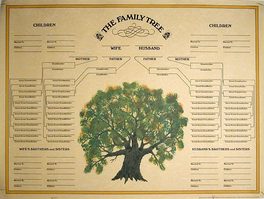 But he replied to the man who told him, "Who is my mother, and who are my brothers?" And stretching out his hand toward his disciples, he said, "Here are my mother and my brothers! For whoever does the will of my Father in heaven is my brother and sister and mother." Matthew 12:48-50 As the traditional roles and relationships within Western culture fade, Christ's question “Who is my mother and brothers?” probably doesn't strike us in the way that it flabbergasted the Eastern culture, where familial roles and traditions are nonnegotiable, where He uttered it. What does Jesus mean by eternally unforgiveable sin? Can this sin be committed today? By a believer?1/4/2012  And whoever speaks a word against the Son of Man will be forgiven, but whoever speaks against the Holy Spirit will not be forgiven, either in this age or in the age to come. (Matthew 12 :32) Some have read these words of Christ and surmised that “blaspheming the Holy Spirit” is either a sin the God cannot forgive, or one that God will not forgive. In both of these instances, God is left either unable to forgive and thus not omnipotent, or unwilling to forgive and thus not all loving. |
AuthorBrett Yardley: Categories
All
Archives
January 2019
|
